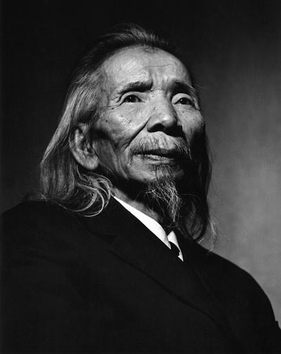Văn Cao facts for kids
Quick facts for kids
Văn Cao
|
|
|---|---|
 |
|
| Born |
Nguyễn Văn Cao
15 November 1923 Hai Phong, French Indochina
|
| Died | 10 July 1995 (aged 71) Hanoi, Vietnam
|
| Nationality | Vietnamese |
| Occupation | Composer |
| Known for | Composing music |
|
Notable work
|
Tiến Quân Ca |
Văn Cao (born Nguyễn Văn Cao, November 15, 1923 – July 10, 1995) was a very important Vietnamese composer. He wrote the famous song Tiến Quân Ca, which is now the national anthem of Vietnam. Many people think he was one of the three most important Vietnamese musicians of the 20th century, along with Phạm Duy and Trịnh Công Sơn. Văn Cao was also a talented poet and painter. In 1996, after he passed away, he received the Hồ Chí Minh Prize for his amazing music.
Career
After an event in 1956 called the Nhân Văn–Giai Phẩm affair, which was about cultural freedom, Văn Cao had to stop writing music for a while. Most of his songs were not allowed to be played in North Vietnam. Only a few, like Tiến Quân Ca, Làng Tôi, Tiến Về Hà Nội, and Trường Ca Sông Lô, were still permitted.
All of his songs were allowed again in Vietnam after 1987. This was during a time of big changes called Đổi Mới. In 1991, an American composer named Robert Ashley wrote a piano piece called Văn Cao's Meditation. It was inspired by the idea of Văn Cao playing his piano.
Works
Văn Cao created many different kinds of art. He wrote songs, poems, and even painted pictures. Here are some of his most well-known works.
Songs
- Bắc Sơn (1945) (This song was about the Bắc Sơn Uprising. It was first written for a play with the same name by Nguyễn Huy Tưởng.)
- Bài ca Chiến sĩ Hải quân (1945) ("Song for Marines")
- Bến xuân (1942) ("Spring River Dock", Văn Cao wrote the music, and he wrote the lyrics with Phạm Duy.)
- Buồn tàn thu (1939) ("Sadness at the End of Autumn", this was Văn Cao's very first song.)
- Chiến sĩ Việt Nam (1945) ("Vietnamese Soldiers")
- Cung đàn xưa ("The Old Tune")
- Đàn chim Việt (1944) ("Vietnamese Flock of Birds" - this song used new lyrics for the music from Bến xuân.)
- Đêm sơn cước ("A Night in the Mountain")
- Gò Đống Đa (1942) ("Đống Đa Mound")
- Hải quân Việt Nam hành khúc (1945) ("Vietnamese Navy March")
- Hò kéo gỗ Bạch Đằng Giang (1941)
- Không quân Việt Nam hành khúc (1945) ("Vietnamese Air Force March")
- Làng tôi (1947) ("My Village")
- Mùa xuân đầu tiên (1976) ("The First Spring" - this was written after Reunification Day. It was also Văn Cao's last song.)
- Ngày mai ("Tomorrow")
- Ngày mùa (1948) ("Harvest")
- Suối mơ ("Dreamy Stream")
- Thăng Long hành khúc ca (Thang Long Marching Song)
- Thiên Thai (1941) ("Eden")
- Thu cô liêu
- Tiến Quân Ca (1944) (Army Marching Song)
- Tiến về Hà Nội (March on Hanoi)
- Tình ca Trung du (Trung Du's Love Song)
- Trương Chi (1943) (This is a name, not a phrase.)
- Trường ca sông Lô (1947) ("Lô River Epic")
Poems
- Anh có nghe thấy không (February 1956) ("Do You Hear?". This poem was published in a collection called Giai phẩm Spring.)
- Những người trên cửa biển (1956) ("People at the Sea Gate", this was a long poem about the people of Hải Phòng.)
- Lá (1988) ("Leaves", this was a collection of his poems.)
Paintings
- Cô gái dậy thì (Puberty Girl)
- Thái Hà ấp đêm mưa (Rainy Night in Thái Hà Hamlet)
 | Aurelia Browder |
 | Nannie Helen Burroughs |
 | Michelle Alexander |

